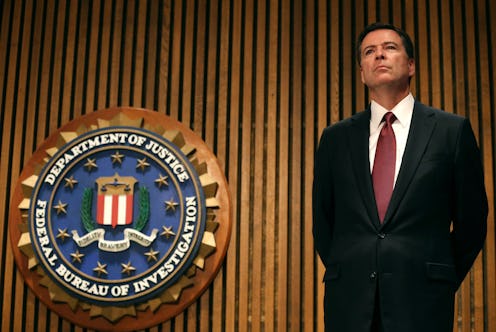News
The Press Is Really Mad at the FBI Right Now
It doesn't just happen in the movies, folks: sometimes, agents from the Federal Bureau of Investigation will pretend to be people they're not. And sometimes, the people they're pretending to be are journalists. In a letter to the New York Times Thursday, the director of the bureau admitted that an FBI agent had impersonated an AP reporter for a criminal investigation — unfortunately, though he emphasized that it had been done in order to catch a bad guy, the AP is decidedly unimpressed.
In the letter, FBI director James Comey described the investigation, saying it was to do with a 15-year-old making bomb threats towards a school in the Seattle area back in 2007. In order to catch the teen, an undercover agent pretended to be an AP reporter who wanted his article reviewed by the suspect. Explains Comey in the letter:
Relying on an agency behavioral assessment that the anonymous suspect was a narcissist, the online undercover officer portrayed himself as an employee of The Associated Press, and asked if the suspect would be willing to review a draft article about the threats and attacks, to be sure that the anonymous suspect was portrayed fairly.
This allowed the FBI to track down the suspect: as soon as the teen clicked on the link to the fake article, the agency was able to locate his whereabouts using the pre-installed malware. The suspect was arrested shortly thereafter, and the bomb threats thankfully never turned into anything more than threats.
This tactic, first reported last week, has not gone down well with the press. Both the Seattle Times — whose likeness they used for the fake article — and the AP have expressed fury at the FBI's policies, arguing that these manoeuvres undermine the separation between government and journalism. Seattle Times editor Kathy Best said that they were "outraged that the FBI misappropriated the name of The Seattle Times to secretly install spyware on the computer of a crime suspect. Not only does that cross the line, it erases it." The AP’s executive editor, Kathleen Carroll,said in a statement:
This latest revelation of how the FBI misappropriated the trusted name of The Associated Press doubles our concern and outrage, expressed earlier to Attorney General Eric Holder, about how the agency's unacceptable tactics undermine AP and the vital distinction between the government and the press.
Comey defended the move, saying that "No actual story was published, and no one except the suspect interacted with the undercover 'A.P.' employee or saw the fake draft story," but AP General Counsel Karen Kaiser pointed out that it could have gone very differently. As she said in a statement:
The FBI may have intended this false story as a trap for only one person. However, the individual could easily have reposted this story to social networks, distributing to thousands of people, under our name, what was essentially a piece of government disinformation.
This is far from the first time that a government agency has created fake personas on the internet: Remember when the Drug Enforcement Agency created a fake Facebook profile in order to catch a drug ring? Let's face it, this kind of move must be a the tip of the iceberg. As Comey himself admitted: "We do use deception at times to catch crooks, but we are acting responsibly and legally."
Images: Getty Images (2)
